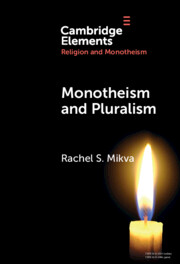203 results
Afro-Brazilian religions and religious diversity: contributions to pluralism
-
- Journal:
- Religious Studies , First View
- Published online by Cambridge University Press:
- 29 April 2024, pp. 1-14
-
- Article
- Export citation

Monotheism and Pluralism
-
- Published online:
- 23 March 2024
- Print publication:
- 04 April 2024
-
- Element
- Export citation
7 - The Crisis in, and of, Constitutional Identity
- from Part I - Foundations, Theory, and Concepts
-
-
- Book:
- Deciphering the Genome of Constitutionalism
- Published online:
- 14 March 2024
- Print publication:
- 21 March 2024, pp 89-98
-
- Chapter
- Export citation
38 - Teaching in Credal Deep Pluralism
- from Part III - Emerging Ethical Pathways and Frameworks
-
-
- Book:
- The Cambridge Handbook of Ethics and Education
- Published online:
- 07 March 2024
- Print publication:
- 14 March 2024, pp 797-820
-
- Chapter
- Export citation
8 - The Child’s Right to Education
-
- Book:
- Fortin's Children's Rights and the Developing Law
- Published online:
- 08 February 2024
- Print publication:
- 29 February 2024, pp 303-338
-
- Chapter
- Export citation
13 - Nonprofits as Enablers of Multilayered Representation
- from Part III - New Directions
-
-
- Book:
- Reimagining Nonprofits
- Published online:
- 11 January 2024
- Print publication:
- 01 February 2024, pp 251-272
-
- Chapter
- Export citation
6 - Roads Not Taken Yet to Be Taken
- from Part II - Building a Socially Embedded Individual Conception
-
- Book:
- Identity, Capabilities, and Changing Economics
- Published online:
- 11 January 2024
- Print publication:
- 01 February 2024, pp 135-160
-
- Chapter
- Export citation
1 - Massive and Minimal Media Effects
-
- Book:
- Real News about the News
- Published online:
- 09 February 2024
- Print publication:
- 01 February 2024, pp 1-16
-
- Chapter
- Export citation
9 - Change in and Changing Economics
- from Part III - Value and Subjectivity
-
- Book:
- Identity, Capabilities, and Changing Economics
- Published online:
- 11 January 2024
- Print publication:
- 01 February 2024, pp 219-245
-
- Chapter
- Export citation
6 - Thomas Kuhn, Normal Science, and Education
- from Part II - Normal Science and Science Education
-
-
- Book:
- Kuhn's <i>The Structure of Scientific Revolutions</i> at 60
- Published online:
- 05 January 2024
- Print publication:
- 18 January 2024, pp 121-134
-
- Chapter
- Export citation
Race and systemic crises in international politics: An agenda for pluralistic scholarship
-
- Journal:
- Review of International Studies / Volume 50 / Issue 3 / May 2024
- Published online by Cambridge University Press:
- 11 January 2024, pp. 457-475
- Print publication:
- May 2024
-
- Article
-
- You have access
- Open access
- HTML
- Export citation
Chapter 7 - Making Magic Happen
- from Part II - The Borders of Pharmacology
-
-
- Book:
- Drugs in the Medieval Mediterranean
- Published online:
- 19 October 2023
- Print publication:
- 02 November 2023, pp 245-276
-
- Chapter
- Export citation
Aquinas on Wisdom
-
- Journal:
- New Blackfriars / Volume 104 / Issue 1114 / November 2023
- Published online by Cambridge University Press:
- 01 January 2024, pp. 726-750
- Print publication:
- November 2023
-
- Article
-
- You have access
- Open access
- HTML
- Export citation
On the Pluralist Critique of Authority
-
- Journal:
- Dialogue: Canadian Philosophical Review / Revue canadienne de philosophie , First View
- Published online by Cambridge University Press:
- 26 October 2023, pp. 1-18
-
- Article
-
- You have access
- Open access
- HTML
- Export citation
Chapter 2 - Analogical Imagination and Ana-theological Believing
- from Part I - Theology and Culture
-
-
- Book:
- Beyond the Analogical Imagination
- Published online:
- 28 September 2023
- Print publication:
- 12 October 2023, pp 41-64
-
- Chapter
- Export citation
7 - Eclecticism and Pluralism
- from PART III - DO MODERATES HAVE A POLITICAL VISION?
-
- Book:
- Why Not Moderation?
- Published online:
- 12 October 2023
- Print publication:
- 12 October 2023, pp 127-134
-
- Chapter
- Export citation
14 - Adam Smith and the Limits of Philosophy
-
-
- Book:
- Interpreting Adam Smith
- Published online:
- 14 September 2023
- Print publication:
- 28 September 2023, pp 232-244
-
- Chapter
- Export citation
6 - Religion and the Constitution since the Glorious Revolution
- from Part I - Perspectives
-
-
- Book:
- The Cambridge Constitutional History of the United Kingdom
- Published online:
- 12 August 2023
- Print publication:
- 17 August 2023, pp 140-167
-
- Chapter
- Export citation
18 - Reflections on Democracy’s Fragility
- from Part IV - Pluralism, Democracy, and the Future of Justice as Fairness
-
-
- Book:
- Rawls’s <i>A Theory of Justice</i> at 50
- Published online:
- 20 July 2023
- Print publication:
- 10 August 2023, pp 313-335
-
- Chapter
- Export citation



